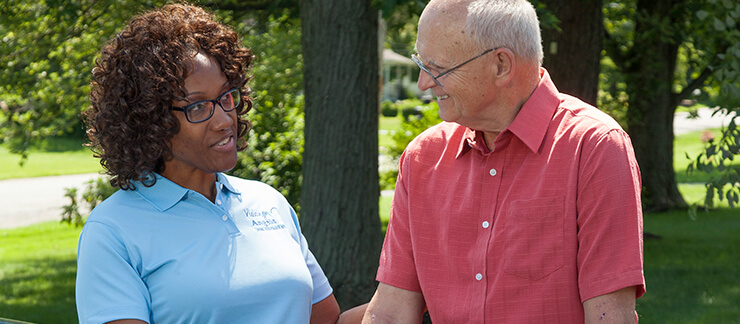
How the Best Providers of Elder Care Services Define "Care"
Different providers of elder care services define “care” in different ways. How they do so can tell you a lot about the way they approach their work and their clients.
Do they think about care simply as a service they provide? The way a plumber or cable technician thinks of their work? Or do they think of care as something larger and more important? As something they owe to their clients and their community?
At Visiting Angels®, we talk a lot about the meaning of care — what it means to us, what it means to our caregivers, and what it means to our clients and their families. One of the strategies we use is viewing the concept of “care” from multiple angles, examining the different facets of high-quality elder care services.
So rather than try to define “care” in a single sentence, let’s look at how care can be viewed through the following four lenses:
- Customization
- Assistance
- Respect
- Engagement
Putting the ‘Care’ in Elder Care Services
Customization
There are few things more personal than the physical and cognitive changes that occur in old age. Growing is a unique process for every senior, with unique challenges and circumstances, and requiring unique solutions.
This is why the best providers of elder care services take the time to customize their services. At Visiting Angels, we build a personalized care plan for every care recipient, with services tailored to the recipient’s daily schedule, personal preferences, and caregiving needs.
In doing so, we make sure that seniors get the services they need to age in place safely and securely. Just as importantly, we do so in a way that’s focused on quality of life and a holistic sense of well-being, keeping them as comfortable and happy as possible.
Assistance
Elder care services are usually a matter of necessity. If it were possible, most seniors would rather age in place independently, without outside help. But at a certain point, this level of independence becomes untenable. Physical and cognitive decline can make it difficult or dangerous for seniors to care for themselves, which threatens their ability to continue living at home.
To age in place, these seniors need outside assistance. This assistance typically comes from one of two sources: family and friends or elder care professionals.
The quality and extent of this assistance will depend on your elder care services provider. Some providers focus on basic services like companion care, which excludes personal care services like dressing, grooming, and bathing assistance. Others will provide both companion care and personal care, as well as additional specialty programs.
So, when you’re meeting with caregivers or agency directors, don’t simply ask about the services they do provide — also ask what kinds of assistance they don’t. And remember, care needs evolve over time. Because of this, it’s worth considering which kinds of assistance may be needed in the future.
Respect
Age-related physical or cognitive decline puts seniors in a vulnerable position. Unable to care for themselves, they must rely on others for their health, well-being, and security. At the same time, they’re often treated with contempt or condescension by others. As a result, they lose their dignity in addition to their independence.
In the field of elder care services, you can measure most caregivers by the respect they afford to seniors. Some caregivers talk down to their clients, treating them similar to children. Others approach each client as a checklist of tasks to complete rather than an as a person with thoughts, feelings and emotions. In many of these cases, the benefits of elder care are offset by the spiritual and emotional hurt inflicted by caregivers.
The best caregivers know that elder care services go being physical and cognitive care, extending to seniors’ emotional and spiritual well-being. Because of this, they approach every client with compassion, and respect, treating seniors with the dignity they deserve, but too rarely receive.
Engagement
A key part of treating seniors with compassion and respect involves active engagement. This involves social interactions with seniors, monitoring the well-being of care recipients, and keeping in touch with families about the status of their loved ones’ elder care services.
Some caregivers are so focused on the care tasks at hand — some of which involve housekeeping in other parts of a client’s home — that they spend little time interacting with elderly adults. Others treat these interactions as a core component of care itself. They provide seniors with a source of conversation and companionship, and they form close relationships with their clients. In doing so, they learn what makes their clients feel most comfortable, happy, and secure.
The best care providers also make an effort to engage with clients’ families. We keep siblings, children, and grandchildren up to date on their loved one’s care and well-being, even if they live hundreds of miles away. We also coordinate with family members to give them more quality time with their elderly loved ones, or to provide respite for family caregivers who are feeling overwhelmed.


